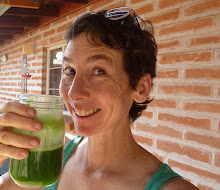
I was reminded this morning that I am on a journey. After heating up my breakfast cereal and making some coffee, I decided to open up some dharma. Dharma really isn't anything special; dharma simply means, wisdom you can use. And dharma can be anything that comes to us via our senses, not just books or words. So, I sat down with my breakfast and John Tarrant's Bring Me the Rhinoceros And Other Koans to Bring You Joy, and this is what I read: "An Impossible Question Means A Journey" (p. 11). In a matter of moments, I had my laptop open and began writing this entry.
In contrast, yesterday morning I sat here where I am now, at my little low table in front of a window, eating my breakfast in my pajamas as the sky lightened up. I was happily reading a book on situated language and learning, sticking little pink and yellow post it notes to pages here and there. Later, as I bicycled to school, I wondered if I am not getting nerdy, reading--and even enjoying--an educational linguistics book before 7 o’clock in the morning. Linguistics books, too, can qualify as dharma. The books I most want to read on my educational journey are ones that will help me help my students learn what it means to learn, not only to learn language, but also what it means to be alive in this world today.
What does it mean to be alive? My answer is: ehi passiko, Sinhalese for go see for yourself. We can read all we want in books, hear loads of lectures, get all kinds of information from the Internet, tv, and radio, but in the end, we have to see for ourselves what is true. Koans can guide us towards what's true; we use koans to move from our particular truths to something bigger, unfixed, open--and, back again.
A few words about koans (ko-ahns): the term koan, meaning a riddle or paradox, entered English from Japanese Zen Buddhism via Chinese Ch'an (Zen). Koan literally means public (ko 公) record (an 案); hundreds of the most famous records (or cases) were recorded in China and Japan. In certain Zen schools, these koans are studied and contemplated in a systematized program, which can guide the Zen student to enlightenment. Tarrant writes that koans "encourage you to make an ally of the unpredictability of the mind and to approach life more as a work of art. The surprise they offer is the one that art offers: inside unpredictability you will find not chaos, but beauty" (p. 11).
Koans show you that you can depend on creative moves.
Koans encourage doubt and curiosity.
Koans rely on uncertainty as a path to happiness.
Koans will undermine your reasons and explanations.
Koans lead you to see life as funny rather than tragic.
Koans will change your idea of who you are, and this will require courage.
Koans uncover a hidden kindness in life.
(pp. 12-13, Bring Me The Rhinoceros)
Replace koans with language and culture learning and it still fits. Learning other languages and cultures, like learning koans, requires living the questions, seeing and thinking "outside the box", an ability to open up further and further, to enjoy the process, and to imagine more than you think you can imagine.
What is the best way to learn languages? It might just be, as Jesus advises, to become as little children (actually, the common translation refers to getting into heaven--you won't get there unless you become as little children). Where is there? And, how do we become as little children? I say heaven (there) is here, now, when we are open (as little children are open), when we are not restricted by our personal stories, and when we can see and hear beyond our personal likes and dislikes. I'm rambling and it's time for me to go to school (school being another word for dharma).


No comments:
Post a Comment